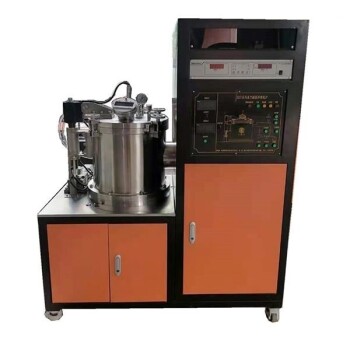Diffusion pumps are specialized vacuum pumps used in applications requiring high to ultra-high vacuum levels. They are not typically used in rough vacuum applications but are essential in industries and processes where achieving and maintaining very low pressures is critical. Diffusion pumps are widely employed in semiconductor manufacturing, surface physics research, particle accelerators, and mass spectrometry. They are also used in vacuum coating, electron microscopy, and space simulation chambers. Their ability to handle large gas loads and operate without moving parts makes them reliable for demanding vacuum environments.
Key Points Explained:

-
Semiconductor and Electronics Industry:
- Diffusion pumps are extensively used in semiconductor manufacturing processes, such as thin-film deposition and etching. These processes require ultra-high vacuum conditions to ensure the purity and precision of the fabricated components.
- They are also employed in the production of electronic devices, where maintaining a contamination-free environment is critical.
-
Research and Development:
- Surface Physics and Material Science: Diffusion pumps are essential in surface physics experiments, where ultra-high vacuum conditions are necessary to study the properties of materials at the atomic level.
- Particle Accelerators: In particle physics research, diffusion pumps are used to create and maintain the vacuum environment required for particle accelerators and colliders.
-
Mass Spectrometry:
- Mass spectrometry relies on high vacuum levels (10⁻³ to 10⁻⁴ mbar) to ensure accurate analysis of molecular and atomic samples. Diffusion pumps are often used to achieve these pressures, enabling precise measurements in analytical chemistry and biochemistry.
-
Vacuum Coating and Thin-Film Deposition:
- Diffusion pumps are widely used in vacuum coating processes, such as physical vapor deposition (PVD) and chemical vapor deposition (CVD). These processes are critical in creating thin films for optical coatings, solar panels, and electronic components.
-
Electron Microscopy:
- Electron microscopes require high vacuum environments to prevent electron scattering and ensure clear imaging. Diffusion pumps are commonly used to achieve the necessary vacuum levels in transmission electron microscopy (TEM) and scanning electron microscopy (SEM).
-
Space Simulation:
- Diffusion pumps are used in space simulation chambers to replicate the vacuum conditions of outer space. These chambers are used to test spacecraft components and materials for their performance in space environments.
-
Medical and Pharmaceutical Applications:
- While not as common as in other industries, diffusion pumps can be used in specialized medical and pharmaceutical research, particularly in processes requiring high vacuum levels, such as freeze-drying and vacuum distillation.
-
Advantages of Diffusion Pumps:
- High Vacuum Capability: Diffusion pumps can achieve pressures as low as 10⁻⁹ mbar, making them ideal for ultra-high vacuum applications.
- No Moving Parts: The absence of moving parts reduces wear and tear, making diffusion pumps reliable and low-maintenance.
- Large Gas Handling Capacity: They can handle large volumes of gas, making them suitable for applications with high gas loads.
-
Limitations and Considerations:
- Oil Contamination: Diffusion pumps use oil as a working fluid, which can lead to contamination in sensitive applications. Careful design and maintenance are required to minimize this risk.
- Backstreaming: There is a risk of oil vapor backstreaming into the vacuum chamber, which can be mitigated using cold traps or baffles.
- Not Suitable for Rough Vacuum: Diffusion pumps are not effective at higher pressures and are typically used in conjunction with roughing pumps to achieve the desired vacuum levels.
In summary, diffusion pumps are critical in industries and research fields that require high to ultra-high vacuum conditions. Their unique capabilities make them indispensable in semiconductor manufacturing, surface physics, mass spectrometry, vacuum coating, electron microscopy, and space simulation. However, their use requires careful consideration of potential contamination and the need for complementary roughing pumps.
Summary Table:
| Application | Key Use Cases |
|---|---|
| Semiconductor Manufacturing | Thin-film deposition, etching, and contamination-free environments |
| Surface Physics Research | Atomic-level material studies in ultra-high vacuum conditions |
| Mass Spectrometry | High vacuum levels for precise molecular and atomic sample analysis |
| Vacuum Coating | PVD, CVD processes for optical coatings, solar panels, and electronics |
| Electron Microscopy | High vacuum for clear imaging in TEM and SEM |
| Space Simulation | Replicating outer space vacuum conditions for spacecraft testing |
| Medical Research | Freeze-drying, vacuum distillation in specialized pharmaceutical applications |
| Advantages | Details |
| High Vacuum Capability | Achieves pressures as low as 10⁻⁹ mbar |
| No Moving Parts | Reliable and low-maintenance design |
| Large Gas Handling Capacity | Suitable for applications with high gas loads |
Discover how diffusion pumps can enhance your high-vacuum processes—contact our experts today for tailored solutions!








